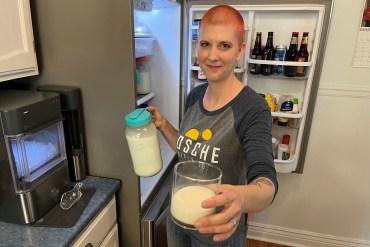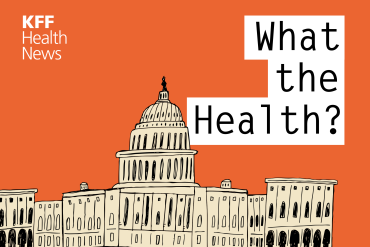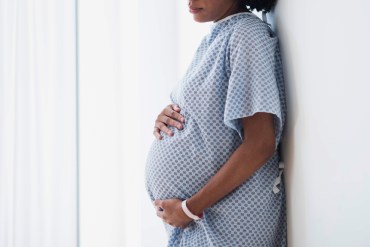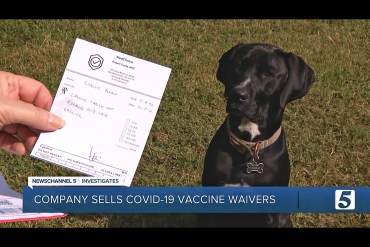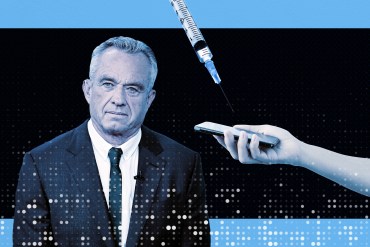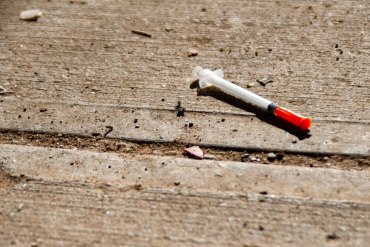CDC to Reduce Funding for States’ Child Vaccination Programs
Citing the recent debt ceiling deal, the CDC is trimming its funding to child vaccination programs that focus on communities vulnerable to disease outbreaks. The cuts come despite data showing the percentage of children getting vaccinated has dropped in recent years.
Más estados legalizan la venta de leche sin pasteurizar, a pesar de las advertencias sanitarias
La pasteurización, desarrollada en el siglo XIX, consiste en someter la leche a un tratamiento de calor para eliminar las bacterias.
More States Legalize Sales of Unpasteurized Milk, Despite Public Health Warnings
Distrust of public health authorities, who say drinking raw milk is dangerous, fuels demand for unpasteurized milk products, leaders on both sides of the issue say.
As Low-Nicotine Cigarettes Hit the Market, Anti-Smoking Groups Press for Wider Standard
The first FDA-authorized cigarettes with 95% less nicotine than traditional smokes will go on sale in California, Florida, and Texas starting in early July. Anti-smoking groups oppose greenlighting just one plant biotech’s products and instead urge federal regulators to set a low-nicotine standard for the entire industry.
New Charleston Museum Nods to Historical Roots of US Health Disparities
The $120 million International African American Museum that opened this week in Charleston, South Carolina, allows visitors to step back in history at Gadsden’s Wharf, where tens of thousands of enslaved Africans arrived in America, the genesis of generations of health disparities.
Más adolescentes adictos a cigarrillos electrónicos con altas dosis de nicotina
El vapeo se ha disparado hasta convertirse en una industria de $8.2 mil millones, y los fabricantes están inundando el mercado con miles de productos que pueden ser mucho más adictivos.
E-Cigs Are Still Flooding the US, Addicting Teens With Higher Nicotine Doses
The FDA, Justice Department, and White House have failed to act as vapes with kid-friendly flavors like cotton candy or gummy bears proliferate.
What does a day in the life of the nation’s top health official really look like? And how much of their agenda is set by the White House? In this special episode of KFF Health News’ “What the Health?” — taped before a live audience at Aspen Ideas: Health, part of the Aspen Ideas Festival, in Aspen, Colorado — host and chief Washington correspondent Julie Rovner leads a rare conversation with the current and two former U.S. secretaries of Health and Human Services. Secretary Xavier Becerra and former secretaries Kathleen Sebelius and Alex Azar talk candidly about what it takes to run a department with more than 80,000 employees and a budget larger than those of many countries.
Black, Rural Southern Women at Gravest Risk From Pregnancy Miss Out on Maternal Health Aid
A federal program meant to reduce maternal and infant mortality in rural areas isn’t reaching Black women who are most likely to die from pregnancy-related causes.
Doctor Lands in the Doghouse After Giving Covid Vaccine Waivers Too Freely
Richard Coble issued vaccine waivers to patients in at least three states without examining them. He was exposed by a Nashville TV station that bought a waiver for a Labrador retriever named Charlie.
California Schools Start Hatching Heat Plans as the Planet Warms
State researchers offer recommendations on how schools can become more heat-resilient in the face of global warming. Proposed changes to state law could make it easier to build shade structures.
Tech Luminaries Give RFK Jr.’s Anti-Vaccine Message a Boost
The views of the leader of a broad anti-vaccine movement who is now running for president are unchallenged in public forums run by several prominent Silicon Valley figures.
Escasez crónica de salvavidas resalta desigualdades raciales
Cuando las autoridades locales toman decisiones sobre el cierre de piscinas o la reducción de horarios, lo hacen sabiendo que la natación tiene un tenso historial de desigualdades raciales.
What Does a Chatbot Know About Eating Disorders? Users of a Help Line Are About to Find Out
The National Eating Disorders Association’s help line has seen demand climb to unsustainable levels since the beginning of the covid pandemic, with more people reporting severe mental health problems, the nonprofit says. But staffers worry this chatbot may make things worse.
Chronic Lifeguard Shortage Serves as Springboard to Address Racial Inequities
Cities and towns are again in deep waters this summer trying to hire enough lifeguards to open their public pools. Many are proceeding with sensitivity to issues of race and ethnicity.
How the Mixed Messaging of Vaccine Skeptics Sows Seeds of Doubt
Some GOP members of the House Select Subcommittee on the Coronavirus Pandemic have two-stepped around vaccine skepticism, proclaiming themselves to be pro-vaccine while also validating the beliefs of people who oppose vaccine mandates. The result could have serious public health consequences.
What the Health? From KFF Health News: Debt Deal Leaves Health Programs (Mostly) Intact
The bipartisan deal to extend the U.S. government’s borrowing authority includes future cuts to federal health agencies, but they are smaller than many expected and do not touch Medicare and Medicaid. Meanwhile, Merck & Co. becomes the first drugmaker to sue Medicare officials over the federal health insurance program’s new authority to negotiate drug prices. Joanne Kenen of the Johns Hopkins Bloomberg School of Public Health and Politico, Lauren Weber of The Washington Post, and Jessie Hellmann of CQ Roll Call join KFF Health News’ chief Washington correspondent, Julie Rovner, to discuss these issues and more. Also this week, Rovner interviews KFF Health News senior correspondent Sarah Jane Tribble, who reported the latest KFF Health News-NPR “Bill of the Month” feature, about the perils of visiting the U.S. with European health insurance.
California Confronts the Threat of ‘Tranq’ as Overdose Crisis Rages
California officials are stepping up efforts to combat the spread of xylazine, a powerful animal sedative that’s increasingly being used by people, often with devastating results. It’s mostly been an East Coast phenomenon, but ‘tranq,’ as it is known, is beginning to appear in the Golden State.
Mood-Altering Mushroom Sales Bloom Despite Safety Concerns
The well-known “Amanita muscaria” mushroom is legal to possess and consume in 49 states. The market for gummies, powders, and capsules containing extracts of the fungus is raising eyebrows, though, amid concerns from the FDA and in the absence of human clinical trials.
What the Health? From KFF Health News: When an Anti-Vaccine Activist Runs for President
Robert F. Kennedy Jr.’s official entry into the presidential race poses a thorny challenge for journalists: how to cover a candidate who’s opposed to vaccines without amplifying misinformation. And South Carolina becomes the latest state in the South to ban abortion after roughly six weeks of pregnancy. Alice Miranda Ollstein of Politico, Rachel Cohrs of Stat, and Sarah Karlin-Smith of the Pink Sheet join KFF Health News chief Washington correspondent Julie Rovner to discuss these issues and more. Also this week, Rovner interviews KFF Health News senior correspondent Aneri Pattani about her project to track the billions of dollars coming from opioid makers to settle lawsuits.





